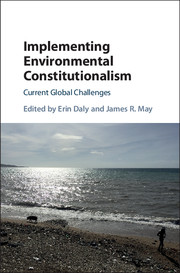Book contents
- Implementing Environmental Constitutionalism
- Implementing Environmental Constitutionalism
- Copyright page
- Dedication
- Epigraph
- Contents
- Figures
- Tables
- Contributors
- Foreword
- Introduction
- Part I Themes and Structures of Environmental Constitutionalism
- Part II Geographies of Implementation
- 6 Implementing Environmental Constitutionalism in Brazil
- 7 Implementing Environmental Constitutionalism in Colombia
- 8 Judicial Implementation of Environmental Constitutionalism in France
- 9 Challenges and Opportunities in Implementing Environmental Constitutionalism in Nigeria
- 10 The Procedural Right of Access to Information as a Means of Implementing Environmental Constitutionalism in South Africa
- 11 Listening to the Silence
- Index
9 - Challenges and Opportunities in Implementing Environmental Constitutionalism in Nigeria
from Part II - Geographies of Implementation
Published online by Cambridge University Press: 02 November 2018
- Implementing Environmental Constitutionalism
- Implementing Environmental Constitutionalism
- Copyright page
- Dedication
- Epigraph
- Contents
- Figures
- Tables
- Contributors
- Foreword
- Introduction
- Part I Themes and Structures of Environmental Constitutionalism
- Part II Geographies of Implementation
- 6 Implementing Environmental Constitutionalism in Brazil
- 7 Implementing Environmental Constitutionalism in Colombia
- 8 Judicial Implementation of Environmental Constitutionalism in France
- 9 Challenges and Opportunities in Implementing Environmental Constitutionalism in Nigeria
- 10 The Procedural Right of Access to Information as a Means of Implementing Environmental Constitutionalism in South Africa
- 11 Listening to the Silence
- Index
Summary
Information
- Type
- Chapter
- Information
- Implementing Environmental ConstitutionalismCurrent Global Challenges, pp. 180 - 192Publisher: Cambridge University PressPrint publication year: 2018
